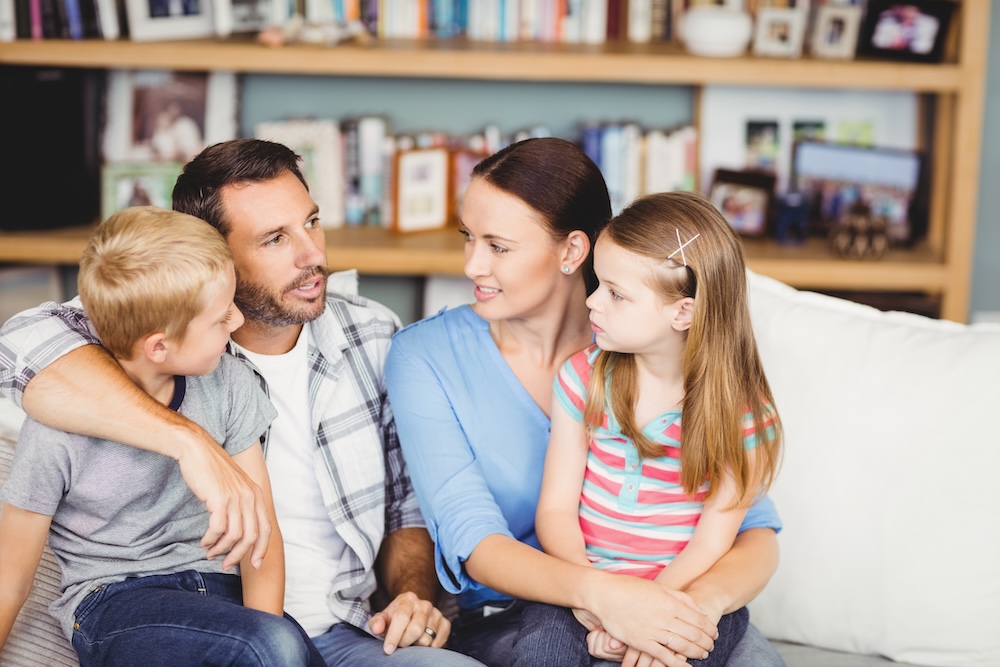How and when do you tell the kids about the divorce? This might be one of the hardest things a parent will ever have to do for many reasons:
- When you have children you commit to always being there for them.
- There is guilt knowing your divorce will impact your children emotionally.
- You will be unable to help them understand why their parents are divorcing.
- You will have to handle their emotions ahead of the challenging emotions you have yourself.
- They are innocent and don’t deserve to be children of divorce.
Here are some tips for how and when to tell the kids about the divorce:
When Should You Tell Your Kids?
Your kids’ emotional reactions will vary depending on their ages, but they will certainly ask a lot of questions. If you don’t have answers, yours and your children’s anxiety will increase significantly when you tell them about the divorce. For this reason, I strongly recommend you don’t tell your children about the divorce until you both have created your full parenting plan which will allow you to answer many of the questions your children will have, such as:
- Where will the children live?
- Where will each parent live?
- Will the children stay in the same school, be involved in the same activities and remain with their friends?
- How will the children’s schedules change?
- How will mom and dad work together for the children?
How do you complete your parenting plan before you tell your children about the divorce? The best way to do this is through mediation because mediation encourages couples to work together, with the mediator, to complete a healthy and thorough parenting plan together. Mediation sessions are also much easier to attend without the children’s knowledge because many mediators will work around your schedules. If litigating, there is a lot of stress that the children pick up on, and preparing for and attending hearings is more difficult to keep from the children.
Should You Tell The Kids Together?
Ideally yes, but it is not easy to do because it is often hard for a couple who is divorcing to work together to do one of the hardest things they have ever done. If the couple can rise about the issues with their relationship and focus on building a healthy co-parenting relationship, they should strive to tell their children together, for the following reasons:
- When parents aren’t aligned on a divorce, children often take sides, protecting the parent who they think is hurting most, and that can impact their relationship with the other parent.
- Children are often terrified hearing their parents are divorcing, but when both parents share the news with the children together, the children have a small sense of calm knowing, seeing and feeling their parents work together. Having an amicable divorce, and parents showing their children they are putting them first at the first mention of divorce, has tremendous value for the children.
How Should You Tell Your kids?
Telling your children that their mom and dad have decided to divorce might be the hardest news your children will have ever heard. With that, it is important to plan the conversation when you and your children have time to listen, react, talk and be together with your children. This should ideally be done on a day when the schedule is open and preferably not right before the children go to bed where they will be lost in their own thoughts.
These are some ideas to think about when scheduling this conversation:
- Don’t do this on a school night, or when you or your spouse are in the middle of stressful deadlines at work.
- A weekend late morning after the children have woken and had breakfast and there is nowhere you need to be is an ideal time. Make sure they are fed. Make sure they have time to absorb and react to the news with both of you. Have time for them to sit and share and ask questions of both of you.
- Be available for your children, together if possible, for the remainder of the day. This is going to be one of the hardest things your children have to face in their lives, and having you both with them all afternoon and evening, if possible, will build a very solid foundation to help them feel comfortable sharing their feelings and being supported and gaining trust that their parents will still always be there for them.
What Specifically Should You Tell Your kids?
Every family and situation is different, but all divorces disrupt children in very similar ways. They will have two primary reactions:
- What will life be like without mom and dad in my life every day, and
- What will change in my life?
You may have thought about a divorce for months, maybe years. You may have gone to counseling to understand your feelings, or talked to friends and relatives and grieved and been scared about your divorce. Remember that your children are hearing about this for the very first time. Even if they suspected something was not good, hearing it will impact them in a very strong way.
In a perfect world you should share the following information:
- Mom and Dad want to talk to you about something.
- We love you and we love our family.
- Mom and Dad have decided together that we are going to separate, or divorce. This was a really hard decision for us. And we are both really sad about it.
- Our biggest priority is you. We will be ok. But we want to minimize any impact to you, so we’re going to work together always to still be “mom and dad” for you. Our family will still be together, just in two different homes.
- We’ve been working together to build a plan for all of us so we can still be happy together and we can still be here for you anytime you need us. We also know that your lives are important to you and we are focused on helping you know that we’re still here for you.
- This is a lot to share, do you have any feelings you want to share with us?
- At this point, encourage them to share their feelings and ask questions. Answer everything they ask so they have answers. If you don’t know the answer, tell them you don’t know the answer yet, and then come back to them together when you have an answer to share.
- Tell them you both have cleared your days, and want to stay with them together for the rest of the day to just talk and be together.
How Should You Handle Your Kids’ Reaction?
It’s hard to predict exactly how each of your children will respond. Each child will certainly have a different reaction, and some may not have any reaction that they can express so you need to be able to help them to express themselves.
- If your kids cry, hug them together.
- If your kids run away to their room, divide and conquer if you have other children, and switch places frequently so your children are with both of you.
- If your kids don’t say anything, just stay with them. Hold them, hug them, be close to them. Sometimes physical touch is more important than words.
- If your kids ask questions, be honest with them, at a high level. They do not need to know every detail now, but help them gain comfort with the questions they ask. If they express that they don’t like the decisions you’ve made, tell them that you’ve been working on this together, with other experts, and feel this is the best plan and that it was built for the children.
- If your kids don’t seem affected, ask them open-ended questions about how they’re feeling, or other aspects of how life will change. You don’t need to go too deep here. Sometimes it’s best to just let this settle and to prompt questions a bit at a time.
To the extent you both can do this together, in lock-step, as “parents”, your children will benefit. Many couples cannot do this together in a healthy way. When this is evident to the children, they lose all confidence that the divorce will not be stressful. It is SO important for you both to act as “parents” to the children you love, and not as “spouses”. This is such a critical time for your children and the more you can support each other through this and be the best co-parents you can be, the better you’ll be able to ease your children’s fears and concerns.
What Happens If One Spouse Informs The Children Prematurely, Or The Children Overhear Your Conversations And Know About The Divorce Before You Are Ready To Tell Them?
Unfortunately this happens often. I strongly advise against this, and I personally guide couples to work together to ensure this does not happen.
If it does, and if your children ask if you are getting a divorce, you can tell them mom and dad and working together to talk about what is best for the family and that you will share with them when you make decisions, but that the children are front and center in everything you decide is best for the family.
Unfortunately, until you have a completed parenting plan, it is very stressful to tell your children about a divorce. I advise trying to defer too much information until you have completed your parenting plan. And again, the best way to accomplish this is to build it through mediation when the children are not home or aware of meetings that you are having to build your parenting plan.
Conclusion
Every family is different. Every situation is unique. The recommendations above may not work for all families. But my hope is that by sharing the ideas you can strive to share information about your divorce in the healthiest way possible, for your family, when the time is right.
If you want to talk about this further, I am a divorce mediator who is laser focused on mitigating negative impacts of your divorce on your children and I am happy to discuss or help you to understand your options and priorities when starting your divorce process. You can reach me directly via cell at (224) 544-9990, via email at michael@michaelsmediation.com or through my website at michaelsmediation.com. I offer extended consultations at no charge so you can become educated and find the healthiest divorce for you and your family.




















